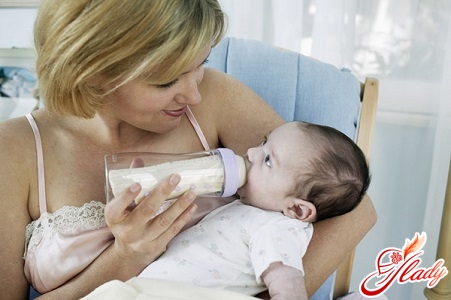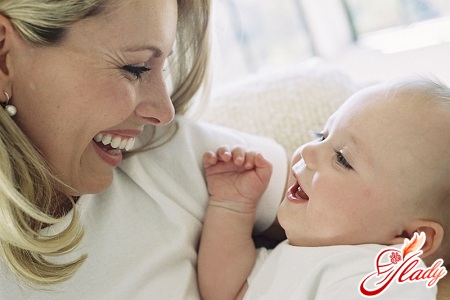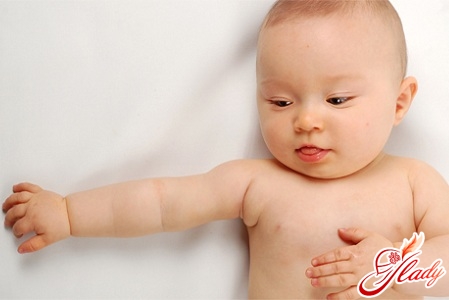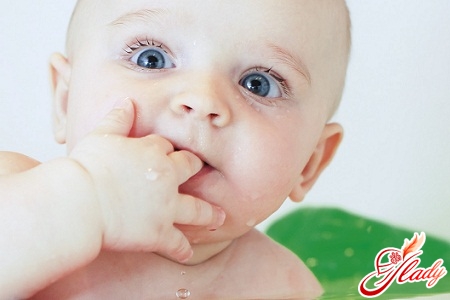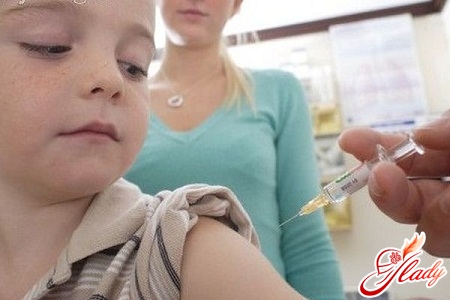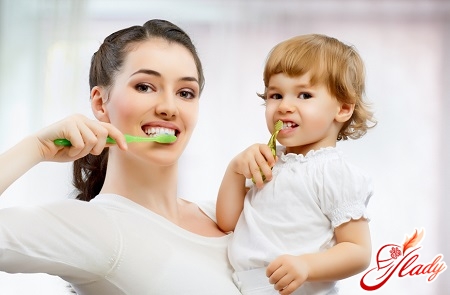 According to dentists, a child shouldteach children to brush their teeth from the age of three. You are mistaken if you think that there is no point in taking care of the oral cavity when there is practically nothing there. Firstly, at this age it is much easier to teach basic hygiene rules without causing protest. Secondly, caries also affects baby teeth. And even if they are replaced later, the presence of bacteria can lead to serious gastrointestinal diseases. Plus, caries can spread to permanent teeth, i.e. molars. And then the baby will have to get fillings. And, as you know, children and dentists are not the best of friends. But how to teach a child to brush their teeth if they do not yet understand that they cannot eat toothpaste, chew on a toothbrush, smear others, and so on? In fact, this is not as difficult as it may seem at first glance. And the sooner you start, the better. You should not wait until your child goes to first grade. Because at this age you are unlikely to achieve daily observance of basic hygiene rules.
According to dentists, a child shouldteach children to brush their teeth from the age of three. You are mistaken if you think that there is no point in taking care of the oral cavity when there is practically nothing there. Firstly, at this age it is much easier to teach basic hygiene rules without causing protest. Secondly, caries also affects baby teeth. And even if they are replaced later, the presence of bacteria can lead to serious gastrointestinal diseases. Plus, caries can spread to permanent teeth, i.e. molars. And then the baby will have to get fillings. And, as you know, children and dentists are not the best of friends. But how to teach a child to brush their teeth if they do not yet understand that they cannot eat toothpaste, chew on a toothbrush, smear others, and so on? In fact, this is not as difficult as it may seem at first glance. And the sooner you start, the better. You should not wait until your child goes to first grade. Because at this age you are unlikely to achieve daily observance of basic hygiene rules.
Cleaning teeth: what parents should remember
Why do you need to brush your teeth?By cleaning the oral cavity, we get rid of not only the unpleasant smell, but also of food debris that begins to decompose over time. They are the source of the appearance and reproduction of bacteria. If you do everything correctly, devoting at least three minutes to this procedure, you can prevent the occurrence of many diseases: periodontal disease, tooth loss, caries, etc. It is better not to use toothpastes until the age of three, so as not to cause poisoning. The child's body is not yet accustomed to various chemicals, plus, the baby may not like the taste very much. As soon as the first milk teeth appear, wipe them with a regular cotton swab moistened with filtered water. This way you can remove food debris from the enamel without harming your child. Starting from the age of three, plus or minus six months, you can accustom the baby to paste and a brush. How to teach a child to brush their teeth? At first, parents will still have to do all the necessary manipulations. In this case, you can use only children's products. Since at this age the baby can swallow toothpaste, it is better not to buy products that contain fluoride and other similar additives.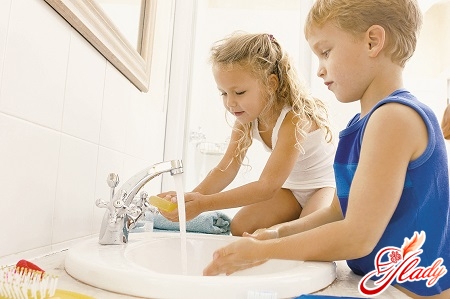
We accustom to oral hygiene of the smallest
If you decide to teach your baby to brush his teeth, thenThis should be done gradually, without showing irritation when your son or daughter fails to do something. It is great if in the future the child will do this procedure with you. As you may have noticed, kids like to repeat everything after adults. At the same time, you should follow the rules that even you and I sometimes forget. Firstly, when brushing the front teeth from the outside, place the toothbrush at an angle of 45 degrees. Movements - from top to bottom, i.e. from the gum to the edge. You seem to be scraping plaque and food debris from the enamel. Secondly, the outer teeth (chewing) are cleaned with a brush located horizontally to the surface. The movements should be reciprocating. Do not forget to pay due attention to the inner side, which needs special care. The duration of the procedure plays an important role in this case. On average, everything takes about three minutes, no less. This is the established norm, both for very young children and for adults. To help your child understand how much time has passed, buy a regular hourglass. To be fair, it should be noted that at three years old, your child is unlikely to spend so much time brushing his teeth. After just a minute, he will get bored. To make sure that little ones want to brush their teeth, and not suffer and get on their parents' nerves, you need to follow these rules:
- Voluntariness
Don't force a toothbrush into your baby's mouth.mouth, thereby causing protest. The first acquaintance with this hygiene product should take place in a calm environment. Allow him to examine the bristles, touch the funny animals or pictures depicted on the handle. Look at magazines together, show cartoons that can be found on the global Internet. Be sure to tell the child how this procedure is useful. It is great if you come up with a fairy tale about teeth, where the paste and brush are saviors, and bacteria are negative characters. It is better to captivate the baby with a funny story than to say that he will have an ugly smile if he does not do this.
- Accuracy
Brushing your teeth should not cause pain ordiscomfort, otherwise your child will be afraid of this procedure in the future. And more than injections. Therefore, you do not need to press hard on the head, trying to scrape off plaque from the enamel. Plus, you injure the gums, and this is fraught with infection.
- Independence
Allow your baby to brush his teethindependently. Even if he does everything wrong, you should not take the brush away from him and shout. You must remain calm in any situation. As a last resort, ask the child to brush the doll's teeth. At the same time, watch the movements and unobtrusively prompt what and how to do it better.
- A game
If your baby continues to be afraid to brush his teeth,Help him overcome his fear. Do it in a playful way. And let the one who copes with the task better than everyone else receive a prize. As a present, give, for example, the most beautiful apple. But buying toys or promising anything - this is not worth doing. Otherwise, the child will understand that parents can be blackmailed. Do everything possible to captivate your child with the game. And then the baby himself will eagerly await the moment when it will be possible to compete in brushing his teeth. Over time, this will become a habit. And at a more conscious age, such hygiene procedures will become the norm for him.
- Performance
If you have failed to teach your baby to brush his teethteeth, try to act out a "performance". After the child has completed all the procedures, take him to a pediatric dentist. He will apply a special agent to the tooth enamel that will show the remaining stains that are not visible to the naked eye in everyday life. Do not worry, as this dye is completely safe. It was specially developed to teach children to properly clean their crops and take care of their oral cavity. Having seen a not very pleasant picture, next time your child will try to do everything correctly. Now you know how to teach a child to brush their teeth without getting nervous and worrying about it. The main thing is to be patient, as clumsy children constantly splash toothpaste around the bathroom, smear the mirror and face. Treat everything with humor.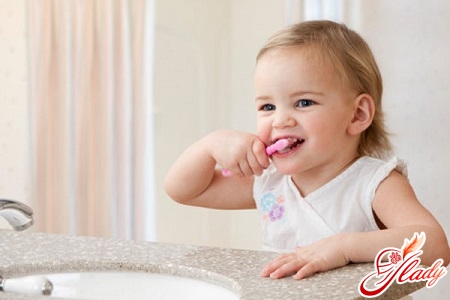
Means for oral care
Unfortunately, modern parents still do notknow what you can use to brush your little ones' teeth and what you should avoid. Do you remember what products you should accustom your children to as early as possible? What hygiene products do dentists recommend using starting at age three? What can you use to brush your first baby teeth?
- Napkins for teeth
These devices are a real salvation foryoung mothers. They are completely safe and do not contain any harmful substances. At the same time, they cope with the task at hand perfectly - they almost instantly erase food residues on the teeth. An absolute plus is that after using them you will not need to rinse your mouth. It is recommended to use wipes from 5 months.
- Toothpastes
As mentioned above, you can't buy a regular onetoothpaste. Today, there are so many different options that even your eyes run wild. Usually, manufacturers produce products with different flavors for the little ones. Strawberry, raspberry, cherry - your child will definitely like this paste. Just make sure that he does not swallow it. Please note: children's toothpaste should be used until all teeth have changed. Then gradually switch to adult. By the way, some packages indicate for what age the product is suitable. The older the child, the more fluoride and other additives there will be in the paste. The only thing that will remain unchanged is the unusual sweet taste and pleasant smell.
- Toothbrushes
When choosing a brush, you should be guided byappearance, as the baby will be attracted by an unusual, colorful thing. But do not forget about quality. Always ask to provide you with certificates and documents confirming the authenticity of the products. Unfortunately, nowadays everything is counterfeited, including even children's products. Remember once and for all: change your toothbrush once every two months, no less often. The head size should not exceed 1 cm. To determine the ideal length, place the bristles on your teeth. If the length of the cleaning part does not cover 2 teeth, then the brush is chosen correctly. Please note: the bristles should be soft so as not to injure the baby's tender gums. The handle of the brush should be comfortable so that the baby can grasp it with his palm.
Precautions: health and safety
Parents need to keep an eye on the child at firstcleanliness of the brush. Experts recommend washing it with baby soap after each brushing. This will prevent bacteria from getting in and multiplying. Plus, it cleans from remaining toothpaste, food particles and other similar elements. Before starting the procedure, make them wash their hands. At first, do not allow your child to brush on their own. You should control the amount of toothpaste applied to the brush, the duration of the procedure itself, the process of rinsing the mouth. Make sure that the baby does not swallow water, does not lick the cap, etc. The harmful effect of children's habits on teeth Do you want your child to have only a snow-white and healthy smile, on which there would be not a single spot, crack? Then wean the baby from some bad habits that can only be fought in childhood. At an older age, it is very difficult to get rid of, for example, licking hands, eating candy at night, etc.
- Taboo on the sweet
Teach your child that after the eveningYou can't eat sweet foods while brushing your teeth. If you really want something tasty, let him eat an apple or a carrot, and then rinse his mouth with plenty of warm water. Candies, cookies, cakes and other similar delicacies remain prohibited. The same applies to sweet drinks, juices, and compotes.
- Licking your fingers
The habit of biting your nails and licking your fingers canlead to deformation of the jaw, the ingress of microbes into the oral cavity. Previously, parents rubbed their babies' hands with pepper so that the children would never want to do this again. Now you can use more humane methods. However, when choosing a product, make sure that your child is not allergic to it. A visit to the dentist: examining baby teeth Before teaching your child to brush their teeth, you should visit the dentist with them. The doctor will examine the oral cavity and check if everything is okay there. The fact is that baby teeth can start to grow incorrectly, forming a gap. Food particles remain in these cracks, which begin to rot. Over time, caries or tartar form there. To avoid this, parents should pay special attention to the problem area when brushing. At what age should you visit the dentist? Preferably from about two or three years old. You should not wait until all the teeth have erupted, as in some cases this is fraught with an incorrect bite. Plus, even little ones can have gum problems caused by poor nutrition, poor ecology, etc. How to accustom a child to a stranger (dentist) who will need to examine his mouth? To begin with, you can take the child with you to the clinic a couple of times so that he sees how calmly you react to such procedures. The main thing is not to panic and not to show fear, otherwise the child will not sit in the chair for any amount of money. If there is no urgent need, do not force the child to do something he does not want. Let him get used to the doctor, begin to trust him. In extreme cases, when there is no other way out, you can administer anesthesia. The little patient will fall asleep, and the dentist will have time to examine and treat the teeth. But it is better to resort to such measures as rarely as possible, so as not to harm the health and not to disturb the psyche of the little person.




